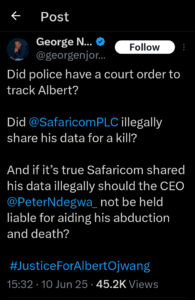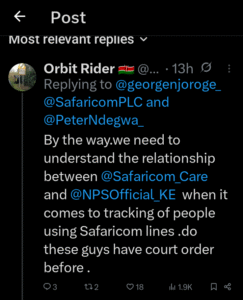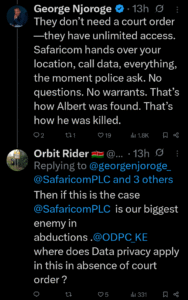The suspicious death of Albert Omondi Ojwang has left many Kenyans in shock and pain, and questions continue to rise about who exactly enabled his arrest and ultimate death. While police claim that Ojwang, a teacher and online influencer, committed suicide in a Nairobi police cell, a post-mortem report has already shown evidence of strangulation and blunt force injuries.
This points to foul play, and the public wants answers. Many now believe that Ojwang’s data may have been unlawfully accessed to help the police trace and arrest him. At the center of these allegations is Safaricom, Kenya’s biggest telecom company, accused of sharing Ojwang’s personal data with police.
Even though there is no direct evidence so far linking Safaricom to Ojwang’s death, the fact that he was arrested shortly after criticizing a senior police officer online has raised eyebrows. How exactly did the police track him from his rural home? Did they have a legal court order to access his data? Or did Safaricom simply hand over his call records and location without following the law?
These are the questions that ordinary Kenyans are asking, especially after a viral post by tech expert George Njoroge questioned Safaricom’s role and whether CEO Peter Ndegwa should be held accountable. Njoroge’s comments sparked a wave of outrage on social media, with many users demanding Safaricom explain how police were able to locate Ojwang so easily.
Safaricom has tried to defend itself, claiming it only shares data when ordered by a court. The company has even repeated this statement several times over the past year. But Kenyans are not convinced. This is not the first time that Safaricom has been mentioned in incidents where citizens were allegedly abducted or traced by state agencies.
In fact, the Kenya Human Rights Commission had already written to Safaricom back in 2024 over concerns that the company may have been giving state agents unrestricted access to customers’ private data. These warnings were ignored. Now, with Ojwang’s death, people are revisiting those concerns and demanding accountability.
The bigger problem here is that Safaricom enjoys too much power and public trust, yet shows little transparency. It is easy for them to deny allegations and hide behind legal language, but that doesn’t solve the problem. If it turns out that they helped police to trace Ojwang without a court order, then they must face legal consequences.
This is not just about one man’s death. It’s about how a powerful corporation may have helped the state silence a voice that was simply speaking out.
Kenyans are already angry, and many are calling for a boycott of Safaricom services. This pressure is necessary. A company that claims to care about data privacy must prove it with real actions, not empty words and PR statements.
Safaricom’s CEO, Peter Ndegwa, cannot hide from these questions. He must explain what protocols the company follows when government officials request access to people’s data. He must also make it public whether there was any data request related to Ojwang and if the company complied. If no court order was provided, then Safaricom clearly violated the Data Protection Act and the rights of an innocent citizen who ended up dead.
At this point, the silence from the top leadership of the company only increases suspicion. Kenyans are watching and will not let this issue disappear.



